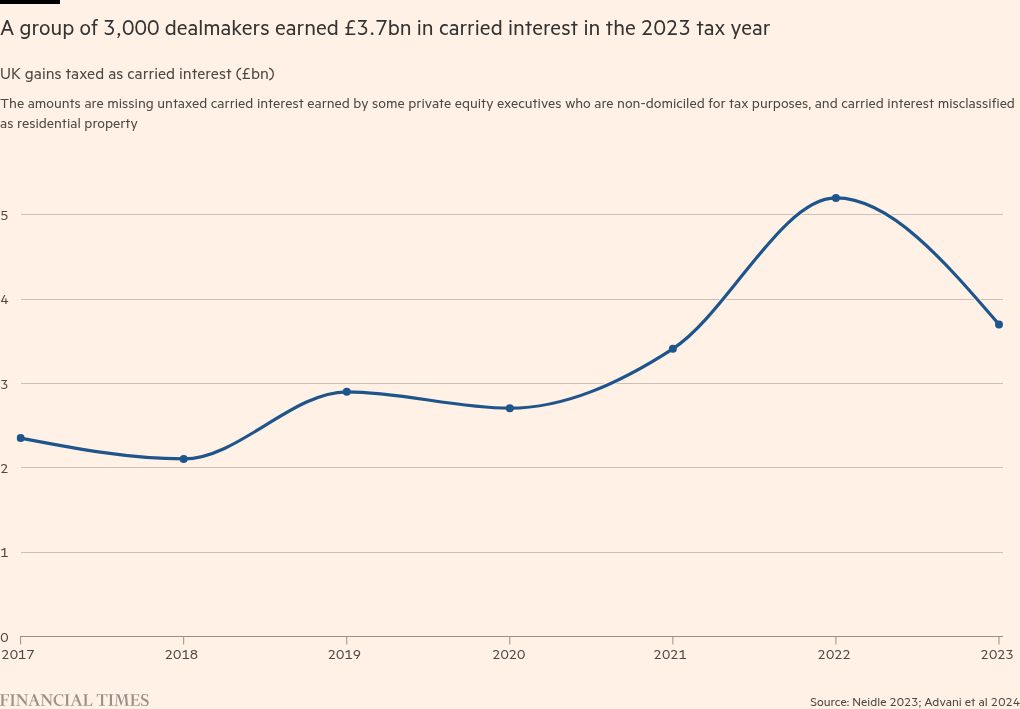Private equity eyes a deal with Rachel Reeves on carried interest

Three years after Rachel Reeves branded private equity dealmakers as asset-strippers, the sector believes the UK chancellor is ready for a compromise on a notorious tax “loophole” they have enjoyed for decades.
After an intensive lobbying campaign, whose tactics have occasionally divided the sector, buyout executives are now confident Reeves will not fully end their favourable tax treatment when she delivers her first Budget.
Many expect the tax rate on “carried interest” — private equity managers’ share of profits on successful deals — to increase by a few percentage points from the current 28 per cent rate of capital gains tax.
They also expect Reeves to reclassify some carried interest away from capital gains to income, on which top earners pay 45 per cent plus national insurance, diluting a 37-year-old tax regime that one boss in 2007 said allowed private equity managers to “pay less tax than a cleaning lady”.
“We are expecting there to be some change in the constraints of what actually carried interest really is, and what qualifies,” said Chris Sanger, UK tax policy leader at EY.
But PE executives, lobbyists and advisers have told the Financial Times they believe they have averted their nightmare scenario of all carried interest being taxed as income. One senior lobbyist claimed Reeves had “become increasingly persuaded” by their protests against the move.
Whether or not the optimism is born out when Reeves delivers her Budget on Wednesday, the lobbying campaign mounted by the $8.2tn buyout industry has highlighted a critical tension in Labour’s agenda: between raising taxes to repair Britain’s public service and courting internationally mobile financiers to encourage investment in to the UK.
The PE industry has been on alert since 2021 when, as shadow chancellor, Reeves declared fund managers were being “handed a tax break . . . as they asset-strip some of our most valued businesses”.
She vowed to end a tax regime enjoyed by just 3,000 people, who paid capital gains rather than income on £3.7bn of carried interest in 2022-23, according to research by the Centre for Analysis of Taxation (CenTax). Reeves was far from the first politician to promise a fiscal crackdown on carried interest. Former US presidents Barack Obama and Donald Trump had made similar pledges without success.
The British Private Equity & Venture Capital Association responded with a well-resourced lobbying effort aimed initially at rebuffing Reeves’ asset- stripping comment — a criticism rooted in the industry’s reputation for loading companies with debt, firing workers and extracting cash.
The BVCA, led by former Liberal Democrat minister Michael Moore, arranged visits for politicians to PE-backed companies in their constituencies, including by Angela Rayner, now deputy prime minister. The “MP Connect” programme began in 2020 but gathered steam as the 2024 general election approached, with 50 MP visits in the past 12 months.
In 2023 the BVCA also hired Karim Palant, a former adviser to ex-Labour shadow chancellor Ed Balls and more recently to Facebook. People in the sector have privately praised Palant’s efforts to deter Labour from a full crackdown on carried interest.
More recently the BVCA was a “commercial partner” for “business day” at Labour’s party conference in September, a package priced at £20,000, according to a document seen by the FT. It also sponsored a breakfast at the Conservatives’ business day the following week.
The BVCA’s measured approach contrasted with private equity’s more fearsome reputation as corporate raiders. One executive at a top private equity firm said the BVCA spent too long trying to sing the industry’s praises instead of making harder-nosed arguments about how higher taxes would make the UK less competitive as a destination than other countries.
The executive said the BVCA eventually appeared to “change tack”. One person with knowledge of the BVCA’s strategy said it had raised the threat to competitiveness consistently behind closed doors and, more recently, in public.
Law firm Macfarlanes, which has a prominent PE practice and is a BVCA member, in May last year broke ranks when it published an analysis showing the amount of tax paid by private equity managers and warning Labour that a harsh crackdown could spark an exodus. “Maybe [Labour] can say they have closed a loophole without shooting the golden goose,” the firm’s head of tax, Damien Crossley, told the FT at the time.
One rival PE lawyer argued Macfarlanes’ approach had “backfired”: the report drew attention to the huge sums of money earned through carried interest. The BVCA disagreed with Macfarlanes’ decision to publicise its report, according to several people familiar with the situation, though others said they had since settled their differences. The BVCA and Macfarlanes declined to comment.
Many large PE firms are taking a multipronged approach, co-operating with trade bodies such as the BVCA but simultaneously using their own advisers, including Global Counsel, the corporate advisory co-founded by former Labour minister Lord Peter Mandelson.
Some have enjoyed direct access to the government at the highest levels. In August, after Labour had taken power, Reeves had dinner in New York with Stephen Schwarzman, boss of Blackstone, which has spent more than £70bn acquiring UK assets from caravan parks to the London Eye.
The next month, Prime Minister Sir Keir Starmer met Blackstone president Jonathan Gray and hailed an investment of up to £10bn by the firm as proof that “Britain is open for business”.
In its manifesto released in June, Labour said private equity was “the only industry where performance-related pay is treated as capital gains” and pledged to “close this loophole”, raising £565mn a year by 2028-29.
The first public sign that Reeves would not pursue a full clampdown came just days later. In mid-June, she told the FT that private equity bosses who invested their own money in their funds could be exempted from any crackdown — an approach taken in France and Italy.
Her comments echoed an industry argument that carried interest should be taxed as a gain because fund managers take investment risk and returns are not guaranteed. Moore welcomed Reeves’ comments as “encouraging”.
But Reeves also noted that at some firms the levels of co-investment were “tiny”. In other cases the investments are funded by the private equity group itself or senior partners subsidise more junior staff.
More than 40 per cent of PE managers who received carried interest in the UK from 2018 to 2020 did not “co-invest” their own money at all, according to CenTax, based on previously unpublished tax data.
In late July, shortly after taking office, Labour launched a “call for evidence” on carried interest taxation. In the subsequent weeks, private equity lobbyists and lawyers held a series of online meetings with the Treasury.
They came away believing that arguments about international competitiveness were hitting home: tax carried interest too much, along with abolishing the non-dom regime, and financiers would leave London for the likes of Italy, Switzerland or the United Arab Emirates, taking with them work that feeds British accountants, lawyers and bankers.
“The lobbying that’s getting the traction is putting the question of fairness to one side and saying this is about international competitiveness,” said Darren Oswick, head of the UK and international tax practices at law firm Simmons & Simmons.
As the 32-day window for submissions drew to a close at the end of August, Starmer separately made a speech warning that people with the “broadest shoulders” would bear the greatest burden in a “painful” Budget.
The BVCA’s Moore later delivered a warning of his own. “We are in a competitive international situation. The capital and the people need to be attracted to and retained in the UK,” he told the BBC as the call for evidence ended.
Reeves told the FT this month she would take a “responsible” approach and “make sure we aren’t reducing investment in Britain”. One official insisted at the time that Labour’s manifesto had not committed to taxing carry at 45 per cent. Another said: “There will be a compromise on this.”
One PE lobbyist predicted that Reeves would reclassify some types of “carry” as income, but not eliminate the preferential treatment entirely, under a new carried interest tax regime.
“There will be some stuff that ultimately falls foul of that regime” and was taxed as income, they said, adding that the Treasury could consult further on the technicalities. Another PE lobbyist warned that nothing was certain until the details were announced by Reeves.
A Treasury spokesperson said: “The Budget will deliver on commitments set out in the manifesto. That includes reforming the tax treatment of carried interest to deliver fairness in this area while recognising the vital role that our world-leading asset management industry plays in channelling investment across the UK.”
Big money is at stake. According to CenTax, £1.8bn, or nearly half, of the carried interest earned in the UK in 2023 was shared among just 100 private equity executives — an average of £18mn each.
#Private #equity #eyes #deal #Rachel #Reeves #carried #interest





